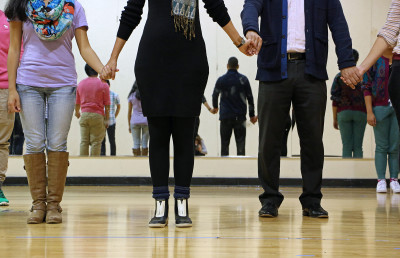
Approximately 100 students gathered for a privilege walk hosted by the BU Asian Student Union Thursday. The “Privilege, Where Do I Stand?” activity aimed to help students discover their individual privileges related to gender, race, ethnicity, class or sexual orientation.
Held at the SAC Gym, the walk began with students standing and holding hands in one line. To discover where each student’s “privilege” stood among others’, students took steps backward or forward following the host’s direction. For example, “If your family has a history of alcoholism or drug abuse, take a step back,” “If you can enter a store without being followed, take one step forward,” or “If English is not your first language, take a step back.”
Andy Shen, a BU ASU member and senior in the College of Engineering, said the walk was meant to create a place for open dialogues on privileges and several issues surrounding them.
“Talking about a sensitive topic for people from different communities is important,” Shen said. “Privilege affects us all. Some people have it and some do not. Watching the walk was pretty powerful and I know [it] resonated with people”.
Due to the intimate nature of the given questions, organizers acknowledged the possibility of uncomfortable moments among participants in a handout, which also said it would have been understandable if some participants did not want to continue the activity halfway through. However, all participants remained in the activity until it finished.
As the activity proceeded, students became further from each other and were eventually unable to hold hands. In the end, students were spread across the room. The dispersed final position among attendees reflected a landscape of unequal privilege.
Following the activity, students continued to the George Sherman Union Back Court to reflect on their experience and engage in conversations about the activity’s outcome.
Several attendees said they gained a better understanding of privilege, and will become more culturally considerate when talking to people from different backgrounds.
Katie Walker, a junior in the College of Arts and Sciences, said she came to the event to learn about perspectives and difficulties people in different communities face. She said she was able to observe her privilege in comparison to other people’s.
“I think a lot about social issues and how I’ve benefited from other underprivileged people who have struggled,” Walker said. “Thinking about [events happening at] University of Missouri, I am horrified of how bad it is for those people and how it is a lot worse for them than it is for me.”
Catherine Shubat, a senior in CAS, said she really wanted to get involved in the conversation regarding privilege and finally had the chance to hear what other students had to say about this issue.
“It is important [to talk about privileges] because if you don’t identify something for what it is, then too often it goes unspoken,” Shubat said. “Having these conversations with people who experience or experience the lack of it reveals a lot of truth into the situation. I am really glad I got to participate because it speaks to privilege itself. You don’t see [privilege] until you see the effects of it.”
Elisabeth McNeill, a senior in the Sargent College of Health and Rehabilitation Sciences, said she not only learned about the different hardship people faced, but also discovered privileges that she had been unaware of.
“I attended this event because I knew a lot of questions would be asked that I never thought of before,” McNeill said. “I wanted to take this time to be introspective and to learn about the struggles other people face that I might not have known before. It gave me a lot of insight into privilege that I didn’t even know I had, but also the struggles other people face and have no control over.”

















































































































